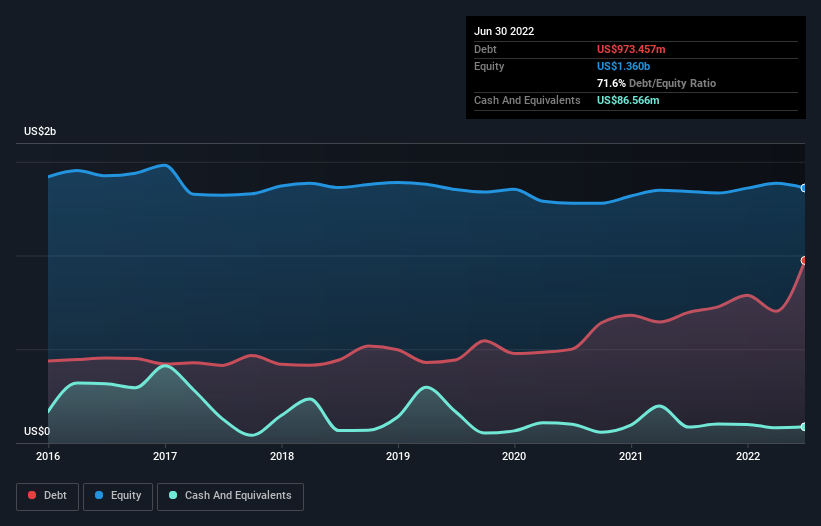
David Iben put it well when he said, 'Volatility is not a risk we care about. What we care about is avoiding the permanent loss of capital.' When we think about how risky a company is, we always like to look at its use of debt, since debt overload can lead to ruin. Importantly, Universal Corporation (NYSE:UVV) does carry debt. But is this debt a concern to shareholders?
When Is Debt Dangerous?
Debt and other liabilities become risky for a business when it cannot easily fulfill those obligations, either with free cash flow or by raising capital at an attractive price. Part and parcel of capitalism is the process of 'creative destruction' where failed businesses are mercilessly liquidated by their bankers. However, a more common (but still painful) scenario is that it has to raise new equity capital at a low price, thus permanently diluting shareholders. Of course, the upside of debt is that it often represents cheap capital, especially when it replaces dilution in a company with the ability to reinvest at high rates of return. The first step when considering a company's debt levels is to consider its cash and debt together.
Our analysis indicates that UVV is potentially undervalued!
What Is Universal's Net Debt?
The image below, which you can click on for greater detail, shows that at June 2022 Universal had debt of US$973.5m, up from US$696.5m in one year. However, it does have US$86.6m in cash offsetting this, leading to net debt of about US$886.9m.

A Look At Universal's Liabilities
According to the last reported balance sheet, Universal had liabilities of US$742.0m due within 12 months, and liabilities of US$677.3m due beyond 12 months. Offsetting these obligations, it had cash of US$86.6m as well as receivables valued at US$367.6m due within 12 months. So it has liabilities totalling US$965.1m more than its cash and near-term receivables, combined.
This is a mountain of leverage relative to its market capitalization of US$1.14b. This suggests shareholders would be heavily diluted if the company needed to shore up its balance sheet in a hurry.
In order to size up a company's debt relative to its earnings, we calculate its net debt divided by its earnings before interest, tax, depreciation, and amortization (EBITDA) and its earnings before interest and tax (EBIT) divided by its interest expense (its interest cover). The advantage of this approach is that we take into account both the absolute quantum of debt (with net debt to EBITDA) and the actual interest expenses associated with that debt (with its interest cover ratio).
Universal has a debt to EBITDA ratio of 3.9 and its EBIT covered its interest expense 6.4 times. This suggests that while the debt levels are significant, we'd stop short of calling them problematic. Unfortunately, Universal saw its EBIT slide 4.3% in the last twelve months. If earnings continue on that decline then managing that debt will be difficult like delivering hot soup on a unicycle. When analysing debt levels, the balance sheet is the obvious place to start. But it is Universal's earnings that will influence how the balance sheet holds up in the future. So when considering debt, it's definitely worth looking at the earnings trend. Click here for an interactive snapshot.
Finally, a business needs free cash flow to pay off debt; accounting profits just don't cut it. So it's worth checking how much of that EBIT is backed by free cash flow. In the last three years, Universal basically broke even on a free cash flow basis. Some might say that's a concern, when it comes considering how easily it would be for it to down debt.
Our View
To be frank both Universal's net debt to EBITDA and its track record of converting EBIT to free cash flow make us rather uncomfortable with its debt levels. Having said that, its ability to cover its interest expense with its EBIT isn't such a worry. Overall, we think it's fair to say that Universal has enough debt that there are some real risks around the balance sheet. If everything goes well that may pay off but the downside of this debt is a greater risk of permanent losses. There's no doubt that we learn most about debt from the balance sheet. However, not all investment risk resides within the balance sheet - far from it. Be aware that Universal is showing 3 warning signs in our investment analysis , and 1 of those makes us a bit uncomfortable...
If, after all that, you're more interested in a fast growing company with a rock-solid balance sheet, then check out our list of net cash growth stocks without delay.
New: AI Stock Screener & Alerts
Our new AI Stock Screener scans the market every day to uncover opportunities.
• Dividend Powerhouses (3%+ Yield)
• Undervalued Small Caps with Insider Buying
• High growth Tech and AI Companies
Or build your own from over 50 metrics.
Have feedback on this article? Concerned about the content? Get in touch with us directly. Alternatively, email editorial-team (at) simplywallst.com.
This article by Simply Wall St is general in nature. We provide commentary based on historical data and analyst forecasts only using an unbiased methodology and our articles are not intended to be financial advice. It does not constitute a recommendation to buy or sell any stock, and does not take account of your objectives, or your financial situation. We aim to bring you long-term focused analysis driven by fundamental data. Note that our analysis may not factor in the latest price-sensitive company announcements or qualitative material. Simply Wall St has no position in any stocks mentioned.
About NYSE:UVV
Universal
Engages in sourcing, processing, and supplying leaf tobacco and plant-based ingredients worldwide.
Established dividend payer and fair value.
Similar Companies
Market Insights
Community Narratives



